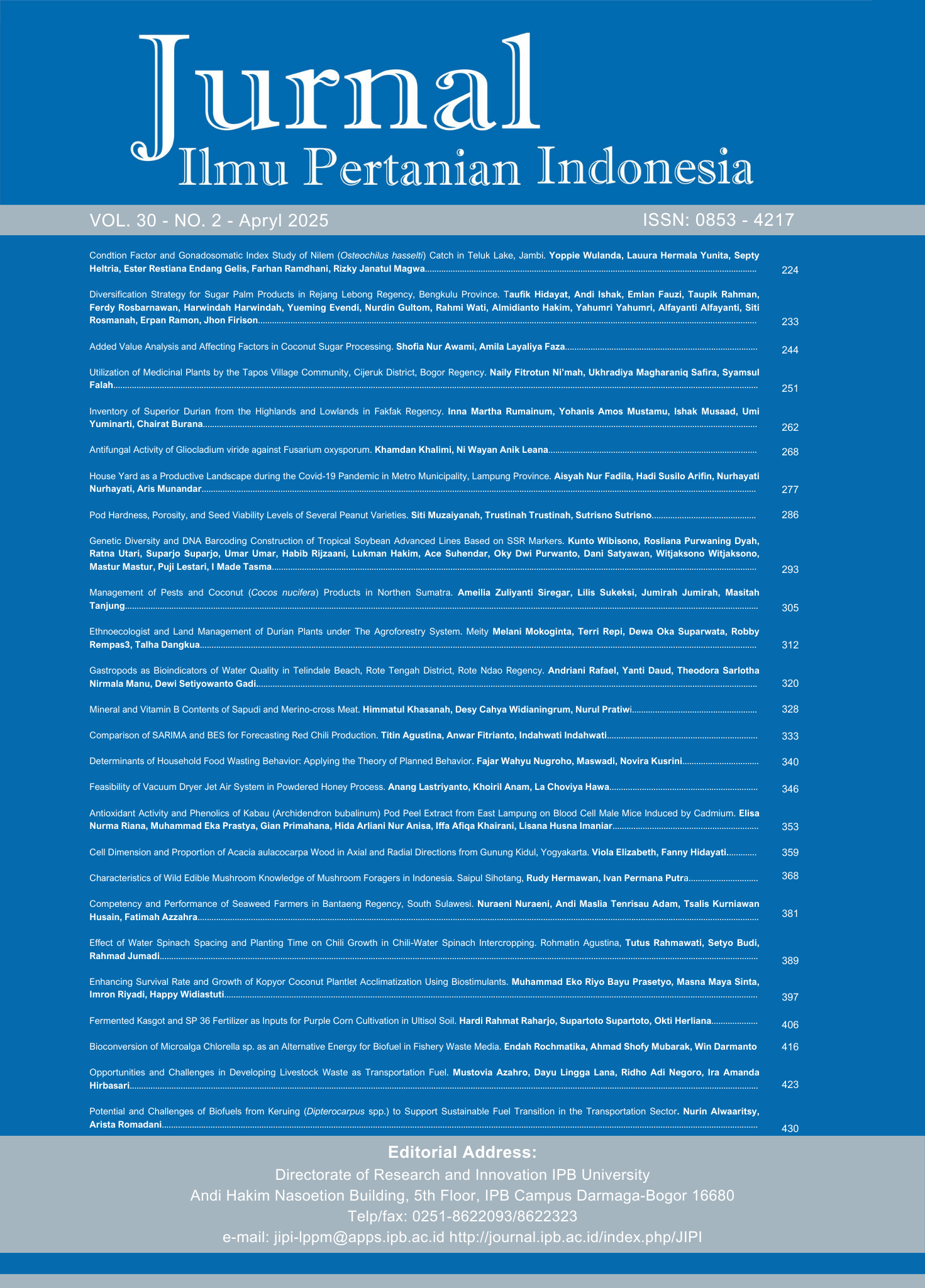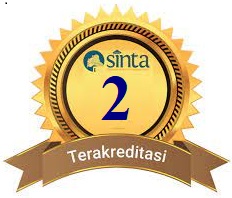Opportunities and Challenges in Developing Livestock Waste as Transportation Fuel
Abstract
In 2023, Indonesia became a top 10 carbon emitter, which is contradictory to its net zero emissions agenda. One of the causes is the use of fossil energy, and it is necessary to transition energy sustainably, especially for the transportation sector, which is the largest contributor to emissions. New renewable energy sources from livestock manure waste can be used as fuels in the transportation sector. Many livestock produce waste that needs to be utilized. Livestock manure waste is widely used as biogas for household-scale applications but is rarely utilized as a biofuel in the transportation sector. This study aimed to analyze the potential and challenges of developing biofuels from livestock waste in Brebes Regency (Indonesia). Biofuel development must be conducted at the regional level to support the acceleration of greenhouse gas emission reduction targets. This research uses data sources in the form of literature studies and interviews, the Analytical Hierarchy Process was used to formulate sustainable energy transition policies. The results of this study describe the opportunities and challenges of developing livestock manure waste as transportation fuel. The Brebes Regency Government can encourage this through policies to accelerate the energy transition.
Keywords: biogas, energy transition, livestock waste, transportation fuel
Downloads
References
ACEA. 2016. Differences between diesel and petrol explained. https://www.acea.auto/fact/differences-between-diesel-and-petrol/
Afazeli H, Jafari A, Rafiee S, Nosrati M. 2014. An investigation of biogas production potential from livestock and slaughterhouse wastes. Renewable and Sustainable Energy Reviews. Vol(no terbit)?: 380386. https://doi.org/10.1016/j.rser.2014.03.016
Afotey B, Sarpong GT. 2023. Estimation of biogas production potential and greenhouse gas emissions. Measurement: Sensors. 25(100650). https://doi.org/10.1016/j.measen.2022.100650
Al Huda, Nova AK. 2023. Transisi energi di Indonesia: Overview & challenges. Buletin Pertamina Energy Institute Volume 9 Nomor 2 Tahun 2023, bulan September 2023.
Ardebili SM, Khademalrasoul A. 2022. An assessment of feasibility and potential of gaseous biofuel. Biomass Conversion and Biorefinery. 12: 5105–5114. https://doi.org/10.1007/s13399-020-00901-z
BPS. 2021. Statistik Lingkungan Hidup indonesia 2021: Energi dan Lingkungan. Jakarta (ID): BPS
BPS. 2024. Kabupaten Brebes dalam Angka Tahun 2024. Jakarta (ID): BPS
BRIN. 2023. Dampak Ekonomi Transisi Energi di Indonesia: Analisis Sektoral
CELIOS. 2024. Peluang dan Tantangan Pendanaan Energi Terbarukan Berbasis Komunitas. Jakarta (ID): CELIOS
Clear Center. 2020. Methane has been the Achille’s heel for cattle emissions, but it may be part of a climate solution. https://clear.ucdavis.edu/news/methane-has-been-achilles-heel-cattle-emissions-it-may-be-part-climate-solution
Darko A, Chan APC, Ameyaw EE, Owusu EK, Pärn E, Edwards DJ. 2018. Review of application of analytic hierarchy process (AHP) in construction. International Journal of Construction Management. 19(5): 436–452. https://doi.org/10.1080/15623599.2018.1452098
Europen Biogas Assosiation. 2020. The potential of biomethane for a faster decarbonisation of transport should not go to waste. https:www.europeanbiogas.eu/acknowledging-the-full-potential-of-biomethane-as-transport-fuel-2/
European Biogas Association. 2023. European Biogas Association Statistical Report 2023. Brussels (BE): European Biogas Association.
Huda S, Wikanta W. 2017. Pemanfaatan limbah kotoran sapi menjadi pupuk organik sebagai upaya mendukung usaha peternakan sapi potong di kelompok tani ternak Mandiri Jaya Desa Moropelang Kec. Babat Kab. Lamongan. Jurnal Pengabdian Kepada Masyarakat. 1(1): 26–35. https://doi.org/10.30651/aks.v1i1.303
IESR. 2024. Indonesia Energy Transition Outlook.
Kefalew T, Lami M. 2021. Biogas and bio-fertilizer production potential of abattoir waste: implication in sustainable waste management in Shashemene City, Ethiopia. Heliyon. 7(11): 1–9. https://doi.org/10.1016/j.heliyon.2021.e08293
Osorio F, Torres J. 2009. Biogas purification from anaerobic digestion in a wastewater treatment. Renewable Energy. 34: 2164–2171. https://doi.org/10.1016/j.renene.2009.02.023
Peraturan Daerah Kabupaten Brebes No. 10 tahun 2024 tentang Pembangunan Jangka Panjang Daerah Kabupaten Brebes Tahun 20242045
Peraturan Daerah Provinsi Jawa Tengah No. 12 Tahun 2018 tentang Rencana Umum Energi Daerah Provinsi Jawa Tengah
Putra LE, Sari KE, Meidiana C. 2020. Pemanfaatan limbah kotoran ternak menjadi energi alternatif biogas skala rumah tangga Dusun Gangsan. Planning for Urban Region and Environment. 9(2): 131138.
Rianawati E, Sagala S, Hafiz I, Anhorn J, AlemuS, Hilbert J, Hofmann F. 2021. The potential of biogas in energy transition in Indonesia. IOP Conference Series: Materials Science and Engineering. pp. 1–9. https://doi.org/10.1088/1757-899X/1143/1/012031
Rebecca AM, Erawan IKP, Erviantono T. 2024. Transformasi energi berkelanjutan di Indonesia: Kebijakan dan tantangan transisi dari batu bara ke energi terbarukan selama dua periode kepemimpinan Jokowi. Triwikrama: Jurnal Ilmu Sosial. 4(4): nomor halaman?
Semin, Siswantoro N, Siswanto A. 2020. Pelatihan pemanfaatan limbah peternakan sapi sebagai bahan bakar biogas murah dan terbarukan di Kampung Susu Dinasty Tulungagung. SEWAGATI, Jurnal Pengabdian kepada Masyarakat. 4(2): 72–78. https://doi.org/10.12962/j26139960.v4i2.6569
Wardana LA, Lukman N, Mukmin, Sahbandi M, Bakti MS, Amalia DW, Wulandari NPA, Sarri DA, Nababan CS. 2021. Pemanfaatan limbah organik (kotoran sapi) menjadi biogas dan pupuk kompos. Jurnal Pengabdian Magister Pendidikan IPA. 4(1): nomor halaman? https://doi.org/10.29303/jpmpi.v3i2.615
Widianingrum DC, Wirantika R. 2023. Peran peternakan dalam mendukung ketahanan pangan Indonesia: Kondisi, potensi, dan peluang pengembangan. Prosiding SEMARTANI 2: 285–291. https://doi.org/10.32528/nms.v2i3.298

This work is licensed under a Creative Commons Attribution-NonCommercial 4.0 International License.
This journal is published under the terms of the Creative Commons Attribution-NonCommercial 4.0 International License. Authors who publish with this journal agree to the following terms: Authors retain copyright and grant the journal right of first publication with the work simultaneously licensed under a Creative Commons Attribution-NonCommercial 4.0 International License. Attribution — You must give appropriate credit, provide a link to the license, and indicate if changes were made. You may do so in any reasonable manner, but not in any way that suggests the licensor endorses you or your use. NonCommercial — You may not use the material for commercial purposes.























